It took some time, some help from Dallas City Councilman Al Lipscomb, and complaints from one royally P.O.'d resident, but at last someone at City Hall has decided that having semis rumbling through a city park is not a good idea.
Seems obvious, you say? You poor schnook. You don't know City Hall.
When the Dallas Observer reported last month ("Road rage," April 15) about plans to build a road next to Highland Hills Park on Bonnie View Road, it seemed likely that the big rigs would soon be rolling. The road had been drawn on maps 20 years ago but never built, and its location became an unofficial part of the park. But when our story was published, construction already had begun on the road, which was intended solely to serve a trailer repair business that had moved next door. The road would have shared the entrance to the Tommie M. Allen Recreation Center in the park.
Tommie M. Allen herself, a neighborhood resident who led the drive to build the park, was not happy about the thought of neighborhood kids serving as speed bumps. She called Lipscomb, who wasn't happy either, and he demanded action. Then she called the Observer, and Rose Farley wrote a story that we suspect didn't make the people responsible too happy.
Under a compromise recently arranged by city staff and awaiting approval by the city council, the trucks will still roll, but farther away from the park, on a narrow, one-way street that's screened by a wall. The original spot for the street will officially become part of the park.
"They came to a happy medium," Lipscomb says.
True colors
Buzz has never doubted that Gov. George W. Bush is a homophobe just like most of his conservative brothers and sisters. But he tended to hide it better than most, adopting a rather pragmatic position on gays: Ignore them, and maybe they won't bother you.
That all changed when the Texas Senate hit total meltdown last week as stubborn Republican senators, led by caucus chair Florence Shapiro of Plano, went to great lengths to kill the hate crimes bill named to honor the memory of Jasper murder victim James Byrd Jr.
Angry Democrats blamed Bush for ordering the bill's demise so that he wouldn't have to take a stand on hate crimes, and thus homosexuality. Taking a stand runs contrary to everything Bush has done so far in his race for the presidency, and he's not about to mess with success now.
Shapiro and the Republican senators say Bush insisted on nothing except that the Senate carry out its independent will. This is, of course, horse hockey.
Buzz looks no further than Shapiro to prove the point. Shapiro not only is Jewish (Jews having initiated the drive for hate crimes legislation in Texas), but was one of two Republican co-sponsors of what was basically the same bill in 1995. This time around, though, Shapiro is telling people that she opposes the bill because she doesn't like that it lumps gays and Holocaust victims together. (Yo, Flo--gays were Holocaust victims too.)
Clearly, whoever is giving Bush advice on this issue wants him to look like a boob. If Buzz were advising the governor, we would have demanded a six-figure fee. No, really. If Buzz were advising the governor, we would have told him to do the following:
Publicly declare support for the hate crimes bill and encourage the Senate Republicans to vote for it. Then, tell the religious-right loons, "Look, you morons, we had this horrific crime in my state, and we needed to address it by making a strong statement against hate." OK, maybe leave out the moron part.
Strategic retreat
If you had a chance to take home $260 million, how far would you go to hang on to it?
Don't answer that. Buzz suspects some of your responses would be obscene.
So we wonder: What induced Houston lawyer Mark Murr earlier this month to give up his claim to the quarter-billion-dollar fee that an unusually friendly arbitration panel decided he had earned for his work on Texas' case against big tobacco?
A guilty conscience over blatant greed? Please. Murr is a lawyer. Or was Murr simply running for cover from allegations that he and his pal, former Texas Attorney General Dan Morales, doctored documents Murr has used to claim his fee?
At a hearing on May 6, Murr's lawyer, Roy Minton, stunned almost everybody when he told U.S. District Judge David Folsom in Texarkana that Murr would withdraw his claim.
Shortly after the state reached a $17.3 billion settlement with the tobacco industry last summer, Morales and Murr began claiming publicly that Murr, unknown to almost everybody, had provided advice to Morales on the case under contracts that current Attorney General John Cornyn now alleges were backdated or otherwise altered.
Nevertheless, a three-person arbitration panel decided that Murr's work was worth $260 million.
The trouble is, Judge Folsom was supposed to appoint one person to that panel. He didn't, and Minton calculated that Folsom might not look kindly on the panel's recommendations, as Murr and Morales picked all of the panel members themselves.
"If that really bothered the judge, hell, I'm not going to fight that battle," Minton says.
Minton says he has not yet given up on his client's claim. He may still go before Folsom and seek a similarly sized award, without the blessing of an arbitration panel.
Fat chance, says one man familiar with the fee fight.
"It isn't going to happen. He is going to slip away quietly into the night and hope that his client is not indicted by some authority," contends Pete Schenkkan, who represented state legislators who challenged a fee agreement Morales had made with five other plaintiff lawyers.
For Schenkkan, the financial calculations of Murr's current award have a nice ring to them. Murr has so far been awarded only $1 million from a national arbitration panel. That money will come from tobacco companies. The fee is supposed to be spread out over some 30 years. By Schenkkan's calculations, that means about $150,000 for Murr in present value.
--Compiled from staff reports by Patrick Williams











